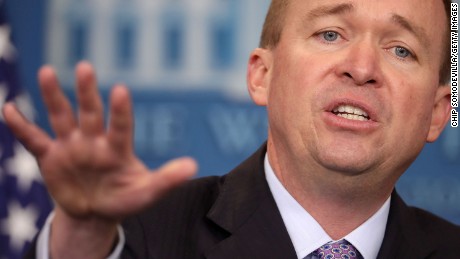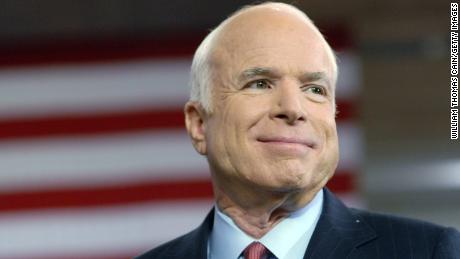Story highlights
- John McCain had made up his mind to vote "no" well before he walked into the Senate
- All of Thursday, the usually talkative senator had declined to show his cards to probing reporters
Washington (CNN)"Mr. McCain."
The clerk read the Arizona senator's surname in the microphone of the tense Senate chamber. The two words were met with silence -- McCain had stepped out of the room minutes before.
But moments later, he reappeared. By then, the alphabetical roll call had reached Sen. Gary Peters of Michigan. McCain walked over to the front of the chamber, raising his right arm. He held it up in the air until he had the attention of the clerk.
"No," he said, with a swift thumbs-down.
It was a "no" that could barely be heard on C-SPAN, and a thumbs-down that viewers would not have been able to easily make out. But the moment was crystal clear for the dozens of reporters watching from the gallery above, who let out a collective gasp and made a stampede exit for the wooden double doors behind them to report the news.
In hindsight, it seems clear: McCain had made up his mind to vote "no" well before he walked into that chamber.
There were hints in his body language, the demeanor of the colleagues who approached him and the way the senator navigated the room. As he huddled with members in a series of hushed conversations while Thursday night turned into Friday morning, there were words that could almost be heard from above and even discerned through lip-reading. The clues were all there.
All of Thursday, the usually talkative senator had declined to show his cards to probing reporters. There was an evening phone call with House Speaker Paul Ryan aimed at reassuring a group of concerned senators they would get their demands for a conference committee, but even after that call, McCain simply said he wasn't convinced. Since his dramatic return to the Senate several days earlier, McCain had agitated over the rushed and partisan way in which Republican leaders crafted their Obamcare repeal bill.
Now, with the future of the GOP health care bill in great suspense -- Senate Majority Leader Mitch McConnell needed 50 "yes" votes and could only afford two defections -- McCain stepped out of his office in the Russell building to make his way to the Capitol shortly before midnight. A CNN reporter was waiting for him, but until the moment he got into the elevator, the senator was on his cell phone.
"Which piece?" McCain said into the phone. "No, I didn't see it. What did it say?"
After a pause, the senator responded: "All right, I'll get ready to do that. But it's very hard to do the right thing."
He ignored the reporter's question about how he would vote.
When McCain walked onto the Senate floor, the chamber was still largely empty. The vote was called shortly after midnight and most senators still had not arrived.
In the cavernous, air-conditioned room, McCain sat down behind a desk next to his best friend, Sen. Lindsey Graham of South Carolina. From the gallery above, the intensity of the conversation was unmistakable. Both men leaned back into their seats, and it was McCain who did most of the talking, gesturing as though he were trying to explain something. Graham nodded along.
Graham's phone -- his famous flip phone -- began to ring, and he stepped out the back to take the call. By then, a number of senators had walked into the chamber. But none would approach McCain. For a short while, he sat alone, looking intently ahead of him, a striking contrast to the continuous fanfare he had received from colleagues since returning to Washington after his brain cancer diagnosis and surgery.
Something was off for GOP leaders. McConnell and his top deputies, including Sen. John Cornyn and Roy Blunt, were gathered with heads bowed, talking quietly.
Then, Sen. Lisa Murkowski of Alaska approached McCain. Murkowski was one of two senators who had voted "no" earlier in the week on a procedural vote and was speculated as a possible "no" vote again on Friday. As McCain spoke to his colleague, he was so animated -- pumping his fists and speaking slowly for emphasis -- that it was possible to read his lips.
"I promise," he seemed to say to Murkowski. Moments later, he gestured with his index finger several times. "One senator," he appeared to say, with space between the two words.
There was soon another conspicuous sign: Sen. Susan Collins of Maine, one senator widely expected to vote "no" on Friday, walked up to McCain. When she did, the group broke into laughter. Collins got comfortable, setting down her bright pink bag.
By this point, Vice President Mike Pence had arrived. If 50 senators voted yes, he would need to be the final, tie-breaking vote.
McCain and Pence spoke for a long stretch, with the vice president standing and the senator still sitting. Once again, McCain was spirited and energetic.
"I promise you," were the words that the senator appeared to say to Pence at one point.
By 1 a.m. ET, it was more than clear that the problem was serious. What was supposed to be a relatively quick procedural vote had dragged out for almost an hour, stuck in limbo as GOP leaders were huddled in hushed conversations. Many eyed McCain from around the room.
Suddenly, the senator was on the move. He stood up from his desk, hugging and kissing Democratic Sen. Kirsten Gillibrand, before walking over to the other side of the room where the Democrats sit.
Surrounded by colleagues from the other party including Senate Minority Leader Chuck Schumer, McCain abruptly flexed his armed inward like a gorilla. It was with such force and playfulness that reporters watching from above collectively laughed, prompting some of the senators to look up. Schumer smiled at the press.
Sen. Chris Coons, one of the senators in that huddle, said this was the moment that McCain informed them of his decision. "He stood with a group of us and said, I am a 'no,'" Coons told CNN afterwards. "I was trying not to jump up and down and smile."
It was also during this conversation that McCain urged his Democratic colleagues to take up the defense bill as quickly as possible after health care was behind them. McCain has hinted that he would likely be returning to Arizona for cancer treatment next week, and he hoped to have a vote on the defense bill on Friday.
Shortly before the roll call began to be called, McCain briefly stepped out of the Senate chamber.
Reporters would later learn that McCain spoke on the phone with President Donald Trump off of the Senate floor. The President tried -- with no success -- to change McCain's mind.















































































